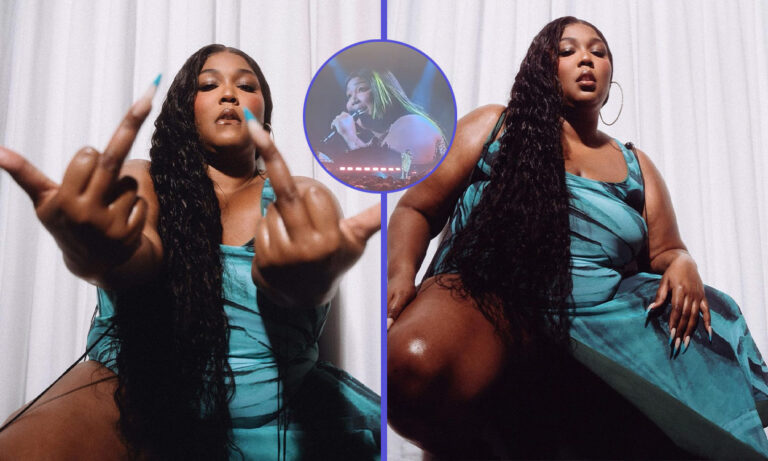Lizzo takes the stage to denounce new anti-abortion and anti-LGBTQIA+ rights bills in Nebraska

In a country that prides itself on being the “land of the free and the home of the brave,” a disheartening truth emerges as Nebraska takes centre stage in the ongoing battle against abortion rights and transgender equality. And global superstar Lizzo is having none of it, as she recently proved during a show held in the US state.
What are Nebraska’s new Republican-led bills about?
Nebraska lawmakers recently passed a controversial bill that includes a ban on abortion at around 10 weeks of pregnancy, combined with another bill that prohibits gender-affirming care for transgender youth. These worrying legislative manoeuvres have garnered national attention, reflecting a wider trend of both Post-Roe bills targeting abortion rights and anti-LGBTQIA+ acts erasing the rights of queer communities across the US.
The passage of the bill was met with strong opposition, with protesters gathering around the state capitol chambers in Lincoln on 19 May 2023. Human rights activists were heard chanting slogans such as “keep your bans off our bodies,” and “save our lives,” as they expressed their outrage while lawmakers finalised their votes.
The bill now awaits the signature of Republican Governor Jim Pillen, who intends to sign it into law. During the protests, at least six individuals were arrested.
Lizzo, known for her empowering messages and advocacy, passionately criticised the legislation during a show that took place in the state on the same night as the vote. She lamented the fact that young people are growing up in a world that fails to protect them and encouraged them to stand firm in their identities.
“It really breaks my heart that there are young people growing up in a world that doesn’t protect them,” she told the crowd. “Don’t let anyone tell you who you are. These laws are not real. You are what’s real, and you deserve to be protected,” the singer went on to add.
@cnn @lizzo appeared emotional at her Friday concert in Omaha, telling the crowd, “Let me be your safe space tonight.” Concert goer @Courtney Koch says Lizzo took a break between songs to address Nebraska’s LB 574, the “Let Them Grow Act,” which bars gender-affirming care for anyone under 19 and will also severely restrict most abortions after 12 weeks. Republican Gov. Jim Pillen says he will sign the bill into law. Koch tells CNN the singer’s words were a “very moving” experience for her and other concert goers. CNN news nebraska lizzo lb574nebraska
♬ original sound - CNN
Lizzo’s bold stance against these discriminatory measures has ignited passionate arguments about individual autonomy, inclusivity, and the relentless fight for justice in the country. LGBTQIA+ advocates and abortion rights groups have also signalled they are prepared to sue the state to block the measure once it is signed into law.
Last week, lawmakers in North Carolina and South Carolina adopted similar abortion restrictions that have been spreading throughout the country, marking a clear stop to abortion care from Texas and Oklahoma, all the way down the Gulf Coast and into the Southeast.
Nebraska’s measures also follow a national movement that has seen hundreds of bills filed in nearly every state over the past two years which are directed against LGBTQIA+ individuals, particularly young trans people. Over a dozen US states have enacted laws or policies banning gender-affirming care for trans youth, and several others are currently considering similar measures.
In only three states, bans have been prevented from taking effect by court injunctions.
The mental health of young trans and non-binary individuals has been significantly impacted by the onslaught of legislation and the resulting political debates. According to polling from The Trevor Project and Morning Consult, a majority of these individuals have experienced negative effects on their mental well-being, including increased suicidal ideation.
And as first reported by The Independent, according to the Human Rights Campaign, more than half of all transgender adolescents between the ages of 13 and 17 in the US face a risk of losing access to what major health organisations deem age-appropriate, medically essential, and potentially life-saving affirming healthcare in their home state.
While the ‘To Be Loved’ and ‘About Damn Time’ singer’s music has captivated millions, it is her skillful utilisation of social media and digital platforms that amplifies her impact and sparks real change when it comes to her own activism. By fearlessly speaking out and taking a stand, Lizzo has inspired a new wave of activism among young people.
In the face of Nebraska’s discriminatory legislation, Lizzo stands tall as a symbol of resilience and defiance. Her unwavering commitment to inclusivity and justice reverberates through the hearts and minds of many gen Zers.
As her battle cry echoes across the digital landscape, it ignites a transformative movement, challenging societal norms and hopefully propelling us closer to a future where freedom and acceptance prevail.





